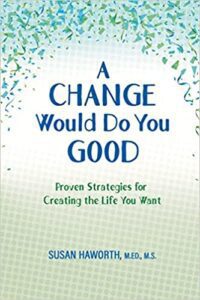
We all want positive changes, but negative changes are challenging to face. Juliet Clark welcomes Susan Haworth, M.Ed., M.S., the author of “A Change Would Do You Good.” Susan talks with Juliet about how we tend to deny warning signs. When we fail to see the signs, we fail to do something about them. So the first big step is acceptance. Accept the beauty in imperfections. See the situation for what it is, and you might still be able to do something about it before it’s too late. Listen and enjoy!
—
Watch the episode here
Listen to the podcast here
A Change Would Do You Good With Susan Haworth, M.Ed., M.S.
We have one of our authors as a guest. You’re going to find her book, maybe something that many of you are looking for and realize you need a lot of change. Before we get started, I want to remind you guys, go download your free subscription of Breakthrough Author Magazine. You can find that www.BreakthroughAuthorMagazine.com. If you haven’t already, Susan is actually featured, she’s our guest, in the February 2022 issue. You can find out more about the book there as well. Be sure to go over to YouTube, Superbrand Publishing, and subscribe over there.
We are appearing on Rumble, as well. If you’re over on Rumble, go find Superbrand Publishing there. Our guest is Susan Haworth. She holds a Bachelor’s Degree in psychology and two Master’s degrees. She’s an overachiever. One of them is in counseling and the other in management. She’s provided counseling, coaching and training to individuals, families, and executives for over four decades.
In addition to publishing articles in numerous trade journals, she’s been featured in the Wall Street Journal and on national and international radio and television programs. For two years, she wrote and hosted a popular daily radio program on WCNN in the Atlanta area called PowerTalk. She’s a contributing writer to StepMom Magazine. If you talk to her about step families, she has a lot of solutions. Welcome, Susan.
Thank you, Juliet. It’s great to be with you.
We forgot to ask you to add in the bio that you were the author of A Change Would Do You Good.
That’s true. Proven Strategies For Creating The Life You Want.
Be willing to change courses when you get the feedback that your strategy isn't working. Share on XWhat prompted you to write this book?
I have been an active blogger for years. The concept of the book started with some of my readers asking me to put my blog posts in a book format. I took myself to Northern California where I live and I began writing a book, came back and realized the blog didn’t do it for me. I trashed everything that I wrote and started over with an outline of the issues that my clients brought to me. I went from there.
That was 2019 and I finished the book in 2021. What I realized about change is that most of us have a love-hate relationship with change. We want positive changes. We want them to be on our own terms. We want the timing to be right. We love that, but then the negative changes or the ones that happen suddenly without our permission get under our skin. We don’t accept them very well. That’s especially true for what we consider negative or the inevitable changes, aging, death, the breakup of relationships, and it goes on. The book is organized into those sections that my client population said they were struggling with. That’s what prompted me to write the book.
You mentioned those unexpected changes. Do you find that those unexpected changes, many of them arise because they’ve come up in the past as patterns and we just haven’t solved them? Do you find that a lot of these are things that we could have undertaken before, but maybe we didn’t already know that we needed change?
That does happen. We’re in denial. Denial is something that is pretty common. When things aren’t going well in our life, we don’t want to face them. This is especially true in relationships. The warning signs were all over the place. The red flags were there, but we just didn’t want to accept those red flags and do something about it. Truthfully, many of my clients and many of us don’t know where to start. We feel overwhelmed. That’s the common theme when people come to see me. They say, “I don’t know where to begin.” The other thing that I find is that sometimes people bark up the wrong tree.
What do you mean by that?
I’ve had a number of clients who’ve come to me and they think that the big problem in their lives is their work. It’s easy to blame everything on work. “I’m stressed out because of work. I’m miserable because of work.” When they dig deeper, they realize that there are other things that are causing them distress. Sometimes it’s their personal relationships. Often, it’s their unrealistic expectations about work or relationships. That’s what really causes a lot of suffering.
Part of that when you’re saying it’s work, we were talking about that denial of those other areas and that there are some things going on that we’re carrying into the workplace. They may be manifesting there, but they really came from something a little deeper that’s going on. I know a lot of times that people embrace it, they’ll say, “I’m ready to change,” but then they get into the change and when it doesn’t go smoothly, they stop.
How do you address that? The biggest thing I’m talking about here is people who jump into it and there have been these patterns, relationships, and way we communicate with others around us and maybe that’s what we’re trying to solve. We start getting pushback because the change doesn’t always just involve us. It involves those around us. How do you handle things like that with an evolving change?
It goes back to what we were talking about earlier that change doesn’t happen on our own terms. Just because we want to do it one way, we rely on other people to help us. If we use the work example, those of us who have looked for work in the past know this is true. We decide in our minds that we’re going to get a new job by whatever date, and then people don’t call you back or you don’t get the interview or the interview schedule you want. You have to rely on other people. A big part of the change process and of life is coping with disappointment that other people are not going to cooperate just because you want them to. You have to learn how to accept that. Acceptance is a big part of it.
You have to have a strategy and be willing to change courses when you get the feedback that your strategy isn’t working. The pandemic has really helped us understand that better because for many of us, our goals were just upended by the pandemic. We couldn’t do things the way we thought we wanted to or could do or plan to do. Our vacations, work schedules, everything was changed. We had to pivot. Those of us who pivoted were able to do that better and survived the disruption better.
One of the examples that I know I used in my book and from what I observed and from friends who are fitness coaches saw is that some of us couldn’t get to the gyms. We couldn’t do our yoga class and whatever. Some people just sat on their tushies and ate bonbons all day while other people thought, “I can do arm curls with soup cans. I don’t have to go to the gym. I can do this.” The ability to pivot and to make changes quickly helps us get to where we want to go. Other people and other life circumstances are not necessarily going to support our plans. Flexibility is really important in making changes.
The other thing, when you were mentioning that I remembered about a month after the pandemic started, someone called me and wanted to start their own online business. He’s very excited. He had two extra hours a day because he wasn’t on the freeway. I said, “That’s great. What are you doing with that?” He said he was drinking. When you were talking about that, it prompted me when you set these goals or go to the change, then you have to behave in alignment. Can you talk about that? That’s the biggest thing with people is, “I want change,” but then they don’t act in a way that’s in alignment with the change that they’d like.
You have to have an action plan to make the change happen and you have to adhere to it and adjust it as you go along. People declare, “I want this. I want a new relationship.” They wait for the UPS driver to come and, “That’s the only person that I see every day.” You have to do something about it. I talked in my book about the difference between expectations and hope, and what hope really is. People think just hoping and wishing for something will make it happen. Hope paired with action gets us to where we want to go. You have to be hopeful, but you also have to take action and be realistic in your expectations or your actions.
Take action today that your future self will thank you for. Share on XIf you want to start a new business and what you’re doing is drinking all day long, that’s not going to work. An action plan is really important. What I help people with are the baby steps to get to where they want to go. If your actions or if your expectations are unrealistic, then you’re going to be disappointed. That’s going to set you back. Sometimes, permanently.
We all know a lot of people who have started down one path and then have given up. Part of that is that they didn’t have small steps to get them to where they wanted to go. They had just, “I’m going to get a new job. I’m going to get 100 clients next month.” How are you going to do that? Is that realistic? It’s very important to have realistic expectations and to have your ambitions be realistic as well.
I remember when I was back in real estate, there was a journal that I had. I was with a coaching company and they had ten things I’m grateful for, because that’s part of change too. You have to be grateful. Change doesn’t happen when you’re resentful, unless you know how to make that happen. We also had to write down ten goals that we wanted and the one thing we were going to do to reach that biggest goal now.
It was very interesting because when I would talk to my coach, he would consistently say, “That top goal is the one. If you don’t write these down, you’re going to be all over the place.” If you have that one goal and you write it down, usually you’re working those top three. It’s too difficult to work all ten at once. Have baby steps like you just talked about. Would you recommend that 1 big goal in baby steps or maybe 2 or 3? How would you approach that?
You have to prioritize. You have to look at what your goals are. We have to set goals. We have to prioritize them. What is the most important thing for you at this point in time? I wrote a piece called My Future Self. In it, I talked about, “What action can you take today that your future self is going to thank you for?” That should align with what your primary goals are. It’s too much if you try to tackle everything at once. Tackle one big thing and sometimes other things will fall in place.
For example, I remember one of my earliest clients. She did come to me because she thought she needed a new job. After several sessions, she came to the realization that her family relationships were causing her distress. Once she worked on those, her work felt better to her. She could take that off the plate or off her agenda of what she needed to change. Sometimes that works too. Sometimes work does need to change and because you changed something at work, your personal relationships improve. Focusing on one big goal at a time is very important. It is overwhelming to tackle a lot of things at once.
What would you say is the biggest thing when you’re tackling these goals that you have to overcome? I feel like, for a lot of people, it’s boundaries. Is that the one that you see the most out in the world with clients that come to you? We all have to set better boundaries as we’re reaching our goals.
Boundaries is certainly a big issue. You mentioned that I work with stepparents. That is so important for stepmoms in particular to set boundaries. That seems to be a common thread. There’s another piece to the boundary issue. I mentioned the unrealistic expectations, but a big piece for people is accepting their imperfections. That gets in the way of a lot of folks reaching their goals. I know it has for me as well. If I can’t be perfect at something, then I don’t try. I don’t go after it. That’s been true for me. You have to accept the beauty in your imperfections.

Do You Good: Unrealistic expectations about work or relationships cause suffering.
You and I have talked about the imposter phenomenon too. That goes in with that. First you have to look at what are your strengths and what areas you might need to work on, but accepting that you’re not going to be strong in every area. You’re going to make mistakes. I’ve had to deal with the imperfections in my writing, which has stopped me from writing very often. The idea of making a mistake, it would just paralyze me.
I see that in a lot of my clients that they’re not accepting of their imperfect selves. It stops them from even trying. That is a big deal. Boundaries are a big deal in relationships. Knowing yourself and what’s acceptable to you in terms of people asking things of you and you’re wanting to be everything to every person. That’s so true for women in particular. It leads to burnout and a lot of suffer.
Is that fear that holds people back? I personally am not one of those people. I jump in. It’s messy and I hate chaos. That might be my own self-sabotage. I’ll get an idea. I’ll jump in and do it. It doesn’t have to be perfect, but it gets messy and chaotic, and then I’m a little overwhelmed. Do you think for most people it’s fear about the way people see them when you talk about they won’t jump in and do something if they can’t be perfect?
At the core of that is fear. Fear prevents us from living the life we want in so many ways. That is at its core. Again, the imposter phenomenon is fear is at the root of that. “They’re going to find out who I am and that’s my imperfect self. They’re going to find out that I’m not as smart and clever. I’m not perfect.” That’s what they’re really going to find out. Fear is at the root of most of it.
I’ve enjoyed working with Susan. We’ve had a lot of interesting conversations outside of getting her book on the market. Where can we find you? Where can we find your book? Talk a little bit about those articles in StepMom too, because I think you’re doing a great service to families out there.
Thank you so much. My company, my practice is Cambios Coaching and Consulting. Cambios is a Spanish word that means change. My website is CambiosCoaching.com and my blog is part of the website. There are all kinds of interesting articles in there. They can find me that way. My book is A Change Would Do You Good. That’s going to be available on Amazon and Barnes & Noble. StepMom Magazine, which is StepMomMagazine.com is an online publication. I have a column called the StepMom Whisperer. I’ve always wanted to have an advice column and this is it.
Accept the beauty in your imperfections. Share on XI love advice columns. I read them all the time. Readers send in questions and I address them in the column and it’s a monthly column. It’s also available on Instagram. You can go on Instagram, @StepMom_Magazine, and get a lot of the snippets that way as well. That’s what we’re doing. It’s a lot of fun for me and it’s very rewarding. I appreciate the opportunity to do a monthly column.
For you, younger readers, an advice column is something that all of us older people grew up with. We all used to read newspapers and Dear Abby.
Advice columns go way back to the 1800s. They’re making a resurgence. It’s not just us older people. They’re really popular for everyone because they’re online now.
I don’t see them as often online, but I remember we used to fight over the paper to read Dear Abby, because some of them were very sad and some of them were hilarious. Thank you, Susan, so much for being a guest. You guys, A Change Would Do You Good, you can find it over on Amazon and Barnes & Noble. It was available on January 25, 2021.
Thank you so much, Juliet.
Important Links
- www.BreakthroughAuthorMagazine.com
- Superbrand Publishing – YouTube
- StepMom Magazine
- A Change Would Do You Good
- CambiosCoaching.com
- Amazon – A Change Would Do You Good
- Barnes & Noble – A Change Would Do You Good
- @StepMom_Magazine – Instagram
About Susan Haworth
 I hold a bachelor’s degree in psychology and two master’s degrees—one in counseling and the other in management—and have provided counseling, coaching, and training to individuals, families, and executives for over four decades. In addition to publishing articles in numerous trade journals, I have been featured in the Wall Street Journal and on national and international radio and television programs. For two years, I wrote and hosted a popular daily radio program on WCNN (Atlanta area) called PowerTalk. Currently, I am a contributing writer to StepMom Magazine.
I hold a bachelor’s degree in psychology and two master’s degrees—one in counseling and the other in management—and have provided counseling, coaching, and training to individuals, families, and executives for over four decades. In addition to publishing articles in numerous trade journals, I have been featured in the Wall Street Journal and on national and international radio and television programs. For two years, I wrote and hosted a popular daily radio program on WCNN (Atlanta area) called PowerTalk. Currently, I am a contributing writer to StepMom Magazine.









Leave A Comment